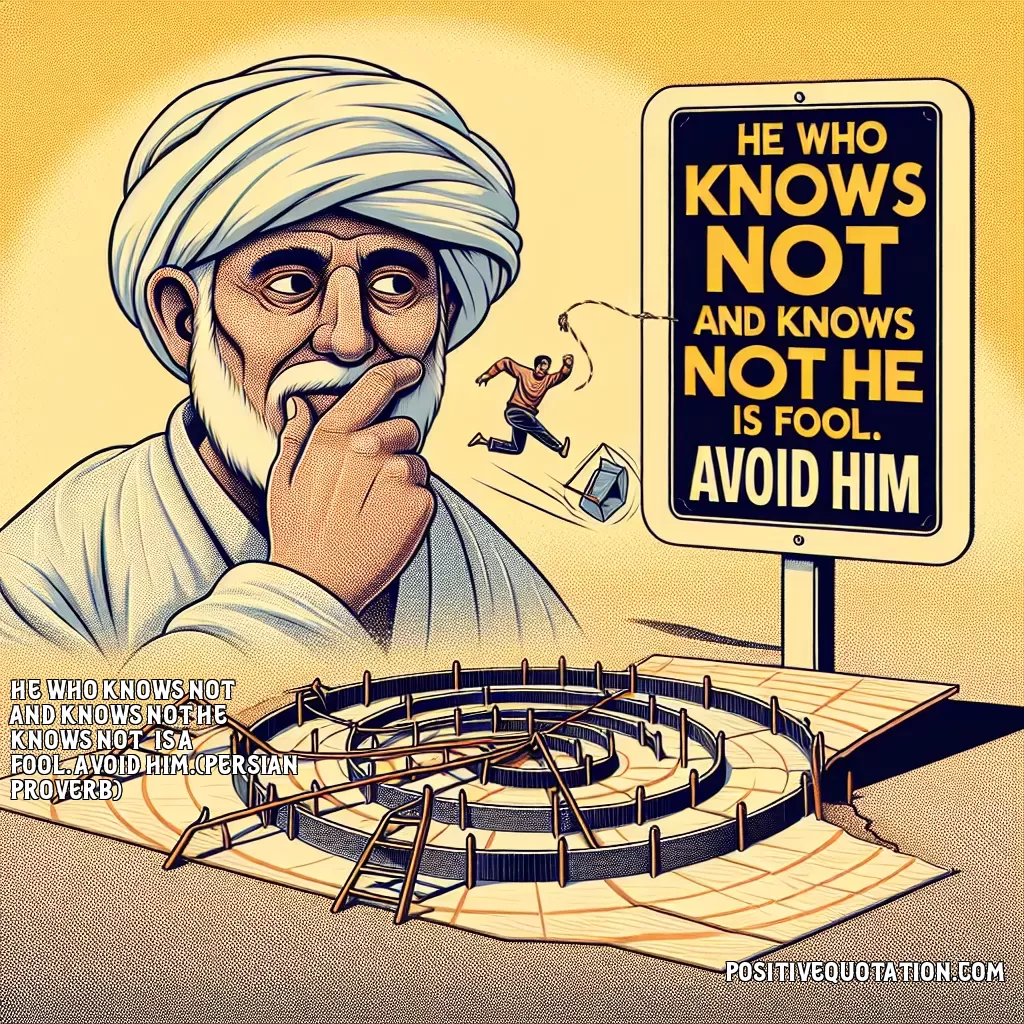
He who knows not and knows not he knows not is a fool. Avoid him.(Persian proverb)
Author: Persian Proverb
👁️ 11 views

He who knows not and knows not he knows not is a fool. Avoid him.(Persian proverb)
👁️ 11 views
This Persian proverb highlights the importance of self-awareness and knowledge. It can be broken down into two parts for better understanding. Firstly, "He who knows not" refers to someone who lacks knowledge or understanding about a particular subject or generally about many things. Knowledge here can pertain to self-awareness, practical skills, wisdom, or factual information. The second part, "and knows not he knows not," refers to a lack of self-awareness or a failure to recognize one's own ignorance. This is a critical component because it implies a person's inability to acknowledge their own shortcomings or gaps in understanding. This lack of self-awareness can prevent them from seeking knowledge or improvement, as they are oblivious to the fact that there is something they do not know. The proverb concludes by labeling such a person as "a fool" and advises one to "avoid him." Here, "fool" is used to describe someone who is not only ignorant but also unwilling or unable to recognize and correct this ignorance. The recommendation to avoid such a person is based on the idea that their ignorance can be detrimental not only to themselves but also to those around them. They may spread misinformation, make poor decisions, or lead others astray due to their overconfidence in what they believe they know. In essence, the proverb teaches the value of self-awareness and the recognition of one's limitations. It suggests that wisdom comes from understanding and acknowledging what one does not know, and that associating with those who lack this insight can be unwise. Through this lens, we see how humility and a willingness to learn are valuable traits to cultivate for personal growth and productive interactions with others.
Quote By: Persian Proverb
### The Wisdom of Persian Proverbs
Persian proverbs, a rich tapestry of wisdom passed down through generations, embody the essence of Iranian culture and philosophy. These succinct expressions often encapsulate profound truths and insights into human nature, relationships, and the complexities of life. A testament to the rich literary tradition of Iran, Persian proverbs reflect the historical experiences, moral lessons, and collective wisdom of the Persian people.
The origins of Persian proverbs can be traced back to ancient times, with influences from Zoroastrianism, Islamic philosophy, and the vast cultural exchanges that have characterized Persia throughout its history. Many proverbs are attributed to well-known Persian poets and thinkers, such as Rumi and Saadi, whose literary works continue to resonate across the globe. For instance, Rumi’s exploration of love and spirituality is often distilled into proverbs that communicate profound emotions in just a few words. Similarly, Saadi’s writings underscore ethical behavior and social virtues, providing guidance on how to navigate life's challenges.
One notable aspect of Persian proverbs is their rhythmic and succinct nature, making them memorable and easy to share. They often utilize metaphors drawn from nature, daily life, and the human experience, bridging gaps between generations. For example, the proverb "A little kindness can go a long way" emphasizes the importance of charity and goodwill, while "The ink of a scholar is more sacred than the blood of a martyr" reflects the value placed on knowledge and education in Persian culture.
Persian proverbs serve not only as a means of communication but also as a mode of cultural preservation. They are often employed in everyday conversation, helping to impart wisdom in a manner that is both entertaining and enlightening. The study of Persian proverbs offers valuable insights into Iranian values, societal norms, and the philosophical underpinnings that shaped one of the world's oldest civilizations.
Through the lens of Persian proverbs, one can appreciate a culture that prizes wisdom, eloquence, and the shared human experience. These timeless sayings, often rich with layers of meaning, continue to offer guidance and inspiration, making them an enduring treasure of literary heritage. The legacy of Persian proverbs reminds us that, regardless of cultural differences, the search for understanding and connection is a universal endeavor.